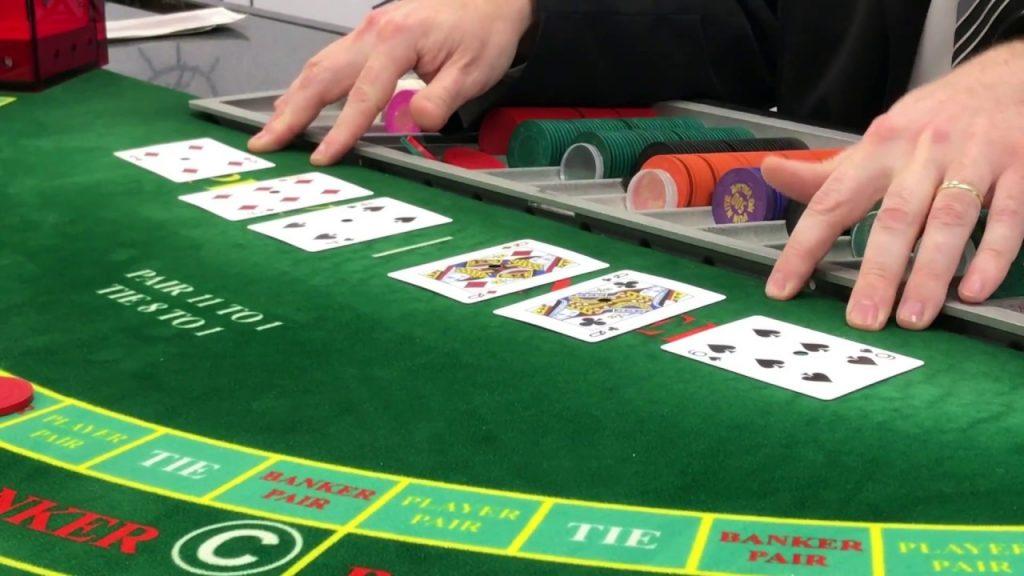Baccarat Bust: Duo Sentenced in Federal Court After Taking Maryland Casinos for $1M
Posted on: January 20, 2020, 11:51h.
Last updated on: January 21, 2020, 10:15h.
Baccarat typically offers gamblers some of the best odds they’ll find at any table game in a casino. However, federal investigators last week shed some light on a scheme two men used allowing them to significantly boost their odds at the card game and take more than $1 million from two Maryland casinos.

According to an FBI release, Chenguang Ni won more than $850,000 from a casino in September 2017. Those winnings came from an impressive run at a baccarat table where Ming Zhang was the dealer.
While the FBI didn’t divulge the casino’s name, federal prosecutors last year identified the casino involved as the MGM National Harbor.
In baccarat, the dealer deals two pairs of cards. One for the player and the other for the banker, and the point value for each respective hand is totaled. Bettors wager before the deal on which hand will be the closest to nine points.
According to baccaratrules.net, in an eight-deck game, the banker will have the higher hand about 45.9 percent of the time and the player will have a 44.6 percent chance (the other times they tie). However, the FBI said Ni and others at his table won 18 times in 21 hands. At one time in that run, he won 14 consecutive times.
Jason Bender, a special agent in the FBI’s Baltimore office, said in the release that officials from the casino contacted authorities the following day. While they suspected cheating, Bender said they weren’t sure how it was done.
The Scheme
In interviews with investigators, the other players at the table said Ni approached them with money and told them to follow his lead at the table. They then gave him the winnings, authorities said.
While the dealer first denied any involvement, Ming Zhang eventually confessed his role in the scheme. The FBI said Zhang confessed to meeting with Ni earlier in the year and developing the plan.
Zhang, who then worked as a dealer at two casinos in Maryland, would tip off Ni to when he would work. When it came time to shuffle the decks, Ni would present the cards to the players. While he would shuffle the decks, there would be one series of cards that would not get shuffled from the way they were displayed on the table.
While the cards were displayed, Ni would take a picture using his phone. He’d then go to the restroom to review the unshuffled cards before returning to play.
“He and the other gamblers he recruited would sit there for a while, playing smaller bets just to move the cards along and keep their seats,” Bender said.
Once the unshuffled cards appeared, the players at the table increased the size of their bets.
He just needed to remember the either/or sequence of the bets—as in player, banker, player, player,” the agent said.
The FBI reported the two used the scheme at another Maryland casino where Zhang worked and won about $200,000.
The Aftermath
In September 2018, in separate cases, Zhang and Ni were indicted on charges of conspiracy to transport stolen funds
Last month, both Zhang and Ni were sentenced after both agreed to plead guilty.
Ni was sentenced to 13 months in federal prison. According to court documents, he had been in custody awaiting trial since November 2018, meaning his sentence equaled the time he had already served. However, since he had been in the country illegally, he was ordered to be deported. He’s also required to pay more than $1 million in restitution.
Last Thursday, US District Judge Paul Grimm signed off on a forfeiture order on Ni’s property.
Zhang was sentenced to 18 months in prison, as well as three years of supervised release. He is scheduled to report to federal prison on Jan. 27. He also must pay more than $1 million in restitution.
However, on Dec. 30, Zhang filed an appeal with the Fourth Circuit Court of Appeals over the length of his sentence and the restitution amount.
Related News Articles
Penn National Eschewing Asia to Avoid US Regulatory Scrutiny
Niagara Fallsview Casino Theatre Proposal Would Block Views of Falls
Most Popular
Mega Millions Reportedly Mulling Substantial Ticket Price Increase
NoMad Hotel to Check Out of Park MGM on Las Vegas Strip
VEGAS MYTHS BUSTED: To ‘86’ Someone Was Vegas Mob Slang for Murder
Most Commented
-
End of the Line for Las Vegas Monorail
— April 5, 2024 — 90 Comments -
Mega Millions Reportedly Mulling Substantial Ticket Price Increase
— April 16, 2024 — 8 Comments -
Long Island Casino Opponents Love New York Licensing Delays
— March 27, 2024 — 5 Comments















Last Comment ( 1 )
The canton of Baccarat is an administrative division of the Meurthe-et-Moselle department, northeastern France. Its borders had been modified at the French canton reorganisation which got here into impact in March 2015. Its seat is in Baccarat. This French museum-related article is a stub. This Meurthe-et-Moselle geographical article is a stub. This article associated to a French film of the 1940s is a stub. This article about a 1940s thriller film is a stub. If an inside hyperlink led you right here, you may want to vary the hyperlink to point directly to the intended article. Textual content is on the market below the Inventive Commons Attribution-ShareAlike License 3.0; extra terms may apply. Its substance is way more dependable and will operate in correctly inside the long haul. What ever the equipment are to get arrange inside your automotive climatic conditions inside the inside or to your exterior, for example the Chrome Wheels, it really is necessary be installed appropriately.